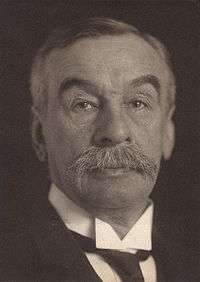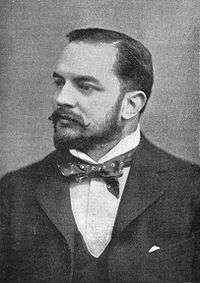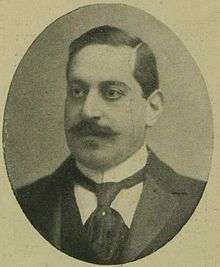St George (UK Parliament constituency)
St George was a parliamentary constituency in what is now the London Borough of Tower Hamlets. It was part of the Parliamentary borough of Tower Hamlets and returned one Member of Parliament to the House of Commons of the Parliament of the United Kingdom.
History
The constituency, formally known as Tower Hamlets, St George Division, was created by the Redistribution of Seats Act 1885 by the division of the existing two-member parliamentary borough of Tower Hamlets into seven divisions, each returning one MP.[1]
This was an area on the north bank of the River Thames, with a lot of its inhabitants employed as dock workers or in the sugar refining industry. Pelling comments that it had the largest proportion of immigrant Irishmen in the metropolis.
The constituency was marginal between the Conservative and Liberal parties. Pelling suggests the Conservative MP, elected in 1885, owed his victory to generosity "bordering on corruption". Political issues important in the area were protectionism (as sugar refining was damaged by foreign subsidies to rivals) and the immigration of "pauper aliens" (the neighbouring division of Whitechapel had a large population of immigrant Jews).
The seat was abolished for the 1918 general election. The area was incorporated in a new seat of Stepney, Whitechapel and St George's.
Boundaries

St George's in London, 1885-1918
The constituency comprised two civil parishes: St George in the East and Wapping.[1] Although lying in Middlesex, the parishes formed part of the East End of London, and were administered as part of the Metropolis.
In 1889 the area was removed from Middlesex to the new County of London, and in 1900 it was included in the Metropolitan Borough of Stepney, but no changes were made to constituency boundaries until 1918.
Members of Parliament
Election results
Elections in the 1880s

Charles Ritchie
Elections in the 1890s

John Benn
Elections in the 1900s

Thomas Dewar

Straus
Elections in the 1910s

Wedgwood Benn
References
- 1 2 Youngs, Frederic A, Jr. (1979). Guide to the Local Administrative Units of England, Vol.I: Southern England. London: Royal Historical Society. p. 749. ISBN 0-901050-67-9.
- ↑ Craig, F.W.S. (1974). British parliamentary election results 1885-1918 (1 ed.). London: Macmillan.
- ↑ Craig, F.W.S. (1974). British parliamentary election results 1885-1918 (1 ed.). London: Macmillan.
- ↑ Craig, F.W.S. (1974). British parliamentary election results 1885-1918 (1 ed.). London: Macmillan.
- ↑ Craig, F.W.S. (1974). British parliamentary election results 1885-1918 (1 ed.). London: Macmillan.





